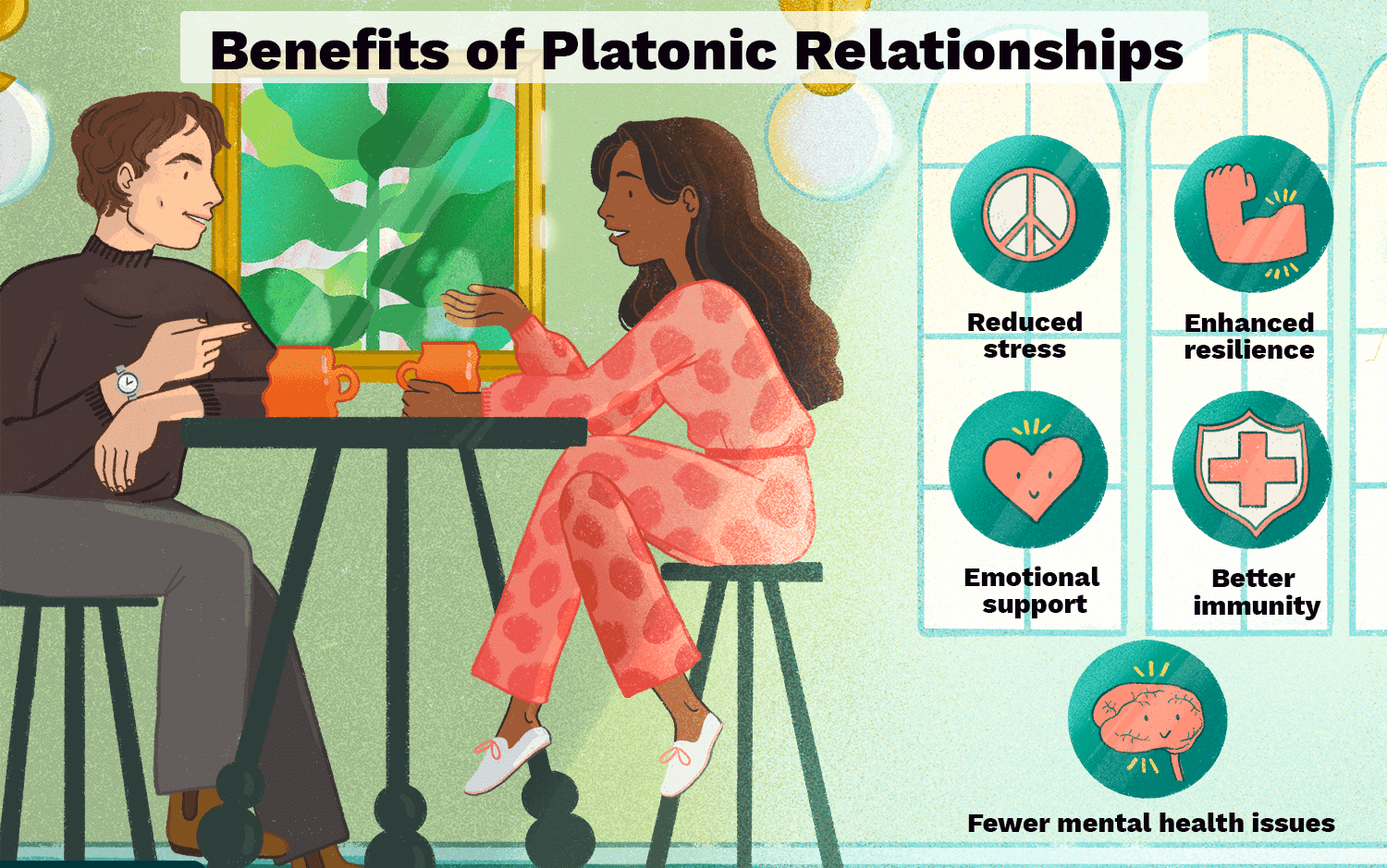What's A Platonic Relationship? A Comprehensive Guide
What's a platonic relationship? Learn about the different types, benefits, and how to build and maintain healthy platonic relationships in our comprehensive guide.
Author:Paolo ReynaReviewer:James PierceNov 11, 202324.9K Shares341.9K Views

What's a platonic relationship? A platonic relationship is a close, non-sexual, and non-romantic relationship between two people. It is a type of relationship that is based on mutual respect, admiration, and trust. Platonic relationships can be just as important and meaningful as romantic relationships, and they can provide people with companionship, support, and love.
Platonic relationships are important for a number of reasons. They can provide us with companionship and support. Platonic friends can be there for us during good times and bad. They can offer us a shoulder to cry on, a listening ear, or simply someone to hang out with. They can also provide us with learning and growth. Platonic friends can help us to learn and grow as individuals. They can challenge our perspectives, introduce us to new ideas, and help us to become better versions of ourselves. They can also give us enjoyment and fulfillment. Platonic friends can make our lives more enjoyable and fulfilling. They can share our interests, go on adventures with us, and help us to have fun. Platonic friends can help us to feel connected and belonging to others. They can provide us with a sense of community and acceptance.
People of all ages, genders, races, and sexual orientations can be in platonic relationships. Platonic relationships can exist between friends, family members, coworkers, classmates, teammates, neighbors, mentors and mentees, and even online friends. There are many different types of platonic relationships, including best friends, close friends, casual friends and acquaintances. Boundaries of platonic relationships can vary depending on the people involved. Some people may feel comfortable with more physical intimacy in their platonic relationships than others. It is important to communicate with your platonic friends about your expectations and boundaries.
Platonic Relationship Meaning
Platonic affection is a form of love characterized by mutual respect, admiration, and trust. It represents a profound and significant connection devoid of sexual or romantic undertones. This kind of love transcends age, gender, sexual orientation, and background, encompassing a wide range of human relationships.
Origin And Historical Context Of The Term "Platonic Love"
- The term "platonic love" has its origins in ancient Greece, particularly in the philosophy of Plato, a renowned Greek philosopher who lived around 428/427 or 424/423–348/347 BCE. The concept of platonic love emerged in the context of Plato's philosophical dialogues, where he explored various aspects of love, human relationships, and the nature of reality.
- The term "platonic" in this context refers to Plato's name and his teachings. Platonic love was initially coined to describe the kind of love that Plato discussed in his dialogues, particularly the Symposium and Phaedrus.
Association With The Greek Philosopher Plato
- Plato's philosophical works, particularly the Symposium, provided the foundation for the concept of platonic love. In this dialogue, Plato discusses the nature of love, focusing on a speech by the character Diotima. According to Diotima's teachings, love progresses from physical attraction to intellectual and spiritual connection.
- Plato argued that the highest form of love, which he termed "eros," was not focused on physical attraction but rather on the pursuit of wisdom, truth, and the development of the soul. He believed that true love involved a deep, intellectual connection and an appreciation of beauty beyond the physical realm.
Evolution Of Concept Over Time
- Over the centuries, the concept of platonic love has evolved and adapted to various cultural and philosophical contexts. While Plato's original ideas emphasized the pursuit of wisdom and intellectual connection, later interpretations expanded the concept.
- During the Renaissance, for example, the notion of platonic love was associated with chaste, spiritual love, often involving a deep emotional connection but without physical intimacy. It was seen as a higher, more noble form of love compared to romantic or sexual love.
- In the modern era, platonic love is often used more broadly to describe non-romantic, deep friendships or connections between individuals. It can encompass various types of emotional bonds where physical or romantic elements are absent.
- The evolution of the concept reflects changing cultural norms and societal attitudes toward love and relationships. It continues to be a subject of discussion and interpretation, reflecting the enduring influence of Plato's philosophical ideas on love and human connections.
Here are some examples of platonic relationships from history and popular culture:
- Socrates and Plato
- David and Jonathan (from the Bible)
- Dante and Beatrice (from The Divine Comedy)
- Romeo and Juliet (as friends, not lovers)
- Sherlock Holmes and Dr. Watson
- Harry Potter and Hermione Granger
- Frodo Baggins and Samwise Gamgee
Platonic Partner
A platonic partner is a person with whom you have a close, non-sexual, and non-romantic relationship. Platonic partners can be best friends, close friends, or even family members. They are people who you can rely on for support, companionship, and love.
Best Friends
Best friends are typically very close platonic friends who share a deep bond. They may have known each other for a long time, and they may feel like they can tell each other anything. Best friends often share the same interests and values, and they enjoy spending time together. They may also support each other through difficult times and celebrate each other's successes. These relationships are marked by a strong sense of loyalty, unwavering support, and a shared history that often spans years. Best friends provide a sense of security and emotional connection that is unmatched. They are the people you can be your true self around, sharing your hopes, fears, and dreams without judgment.
Close Friends
Close friends are also platonic friends who share a close bond. They may not be as close as best friends, but they are still very important to each other. Close friends may share some of the same interests and values as best friends, but they may also have different interests and values. Close friends often enjoy spending time together, but they may not see each other as often as best friends. Close friends can be the backbone of your social life, providing companionship and emotional support. They are often the ones you turn to for advice or a casual hangout.
Casual Friends
Casual friends are platonic friends who are not as close as best friends or close friends. They may enjoy spending time together, but they may not share as deep of a bond. Casual friends may have different interests and values, and they may not see each other very often. They are more on the periphery of your social circle. While you may not share your innermost thoughts, they are still enjoyable to be around.
Acquaintances
Acquaintances are people who we know but who are not close friends. We may interact with them on a regular basis, but we may not know them very well. Acquaintances may be people we work with, go to school with, or live near.
It is important to note that the boundaries of platonic relationships can vary depending on the people involved. Some people may feel comfortable with more physical intimacy in their platonic relationships than others. It is important to communicate with your platonic friends about your expectations and boundaries.
Here are some examples of different types of platonic relationships:
- Two people who have been best friends since childhood
- A group of college friends who stay in touch after graduation
- Two coworkers who bond over their shared love of coffee
- A group of parents who meet up regularly at the playground
- A couple who are close friends with another couple
Platonic relationships can exist between people of all ages, genders, sexual orientations, and backgrounds. They are an important part of a fulfilling life, and they can provide us with companionship, support, and love.
Ways To Build And Maintain Healthy Platonic Relationships
Be Honest And Open
Honesty and openness are essential for any healthy relationship, including platonic ones. When you are honest and open with your platonic friends, you are building trust and intimacy. You are also showing them that you value their opinion and that you are comfortable being yourself around them.
Communicate Effectively
Effective communication is another key component of healthy platonic relationships. This means being able to listen to your friends and share your own thoughts and feelings in a clear and concise way. It also means being able to resolve conflict in a healthy way.
Respect Each Other's Boundaries
Everyone has different boundaries, and it is important to respect your friends' boundaries. This means being mindful of their physical and emotional needs and not doing anything that makes them uncomfortable. It is also important to communicate your own boundaries to your friends.
Be Supportive And Understanding
Platonic friends should be there for each other through thick and thin. This means being supportive and understanding during difficult times. It also means celebrating each other's successes and being a shoulder to cry on when needed.
Be Forgiving And Forgiving
Everyone makes mistakes, and it is important to be forgiving of your platonic friends. This does not mean that you have to forget what happened, but it does mean letting go of anger and resentment. It also means being willing to give your friends a second chance.
Spend Quality Time Together
One of the best ways to build and maintain healthy platonic relationships is to spend quality time together. This means making time for your friends even when you are busy. It also means doing things that you both enjoy and that allow you to connect on a deeper level.
Here are some additional tips for building and maintaining healthy platonic relationships:
- Be yourself- Don't try to be someone you're not just to fit in with your friends. The right friends will like you for who you are.
- Be a good listener- When your friend is talking to you, give them your full attention. Don't interrupt or start talking about yourself.
- Be supportive- Be there for your friend when they need you. Offer advice and encouragement, but don't judge them.
- Be honest- Be honest with your friend, even if it's difficult. Honesty is essential for a healthy relationship.
- Be forgiving- Everyone makes mistakes. If your friend does something to hurt you, be willing to forgive them.
- Have fun- Spending time with your friends should be enjoyable. Make time for activities that you both enjoy.
By following these tips, you can build and maintain healthy platonic relationships that will last a lifetime.
Platonic Relationships And Love
Platonic Relationships And Love Coexisting
Platonic relationships can indeed coexist with love, although it's a different form of love compared to romantic or familial love. Platonic love is characterized by deep affection, care, and emotional intimacy without the romantic or sexual component. It's a profound connection built on mutual respect, trust, and understanding. In platonic relationships, love is expressed through companionship, support, and shared experiences.
Ways To Know If Your Platonic Relationship Is Turning Romantic
- Increased Intimacy -One sign that a platonic relationship might be transitioning into a romantic one is an increase in emotional and physical intimacy. You may find yourselves confiding in each other on a deeper level and feeling more comfortable with physical contact.
- Flirting and Playfulness -If you or your friend start exhibiting more flirtatious or playful behavior, it could be an indication of romantic interest. Subtle teasing, compliments, or suggestive comments may become more common.
- Jealousy or Possessiveness -If you or your friend begin to feel jealous or possessive when the other person interacts with potential romantic interests, this may suggest a shift towards romantic feelings.
- Desire for Exclusivity - The desire to spend more exclusive time with each other, as opposed to maintaining a broader social circle, can be a sign of romantic interest. You may prioritize each other over other friends.
Method To Handle Romantic Feelings In A Platonic Relationship
- Open and Honest Communication -The most important step is to have an open and honest conversation with your friend about your feelings. Share your thoughts and emotions, and encourage them to do the same. This can help clarify where both of you stand.
- Respect Boundaries -If your friend doesn't share the same romantic feelings, it's crucial to respect their boundaries and decision. You can continue the platonic relationship if both parties are comfortable with it, but acknowledging the shift in emotions is essential.
- Evaluate the Relationship -Take some time to reflect on the nature of your connection and whether it's possible to maintain a platonic relationship if one person has developed romantic feelings. You may need to consider whether some distance is necessary to manage your emotions.
- Seek Support -Reach out to trusted friends or a therapist to discuss your feelings and gain perspective on the situation. They can offer guidance on how to navigate these complex emotions.
It is important to remember that platonic relationships can be just as important and meaningful as romantic relationships. If you are lucky enough to have strong platonic relationships in your life, cherish them.
Frequently Asked Questions - What's A Platonic Relationship
Are There Any Downsides To Platonic Relationships?
While platonic relationships are generally positive and fulfilling, challenges can arise, such as misunderstandings or unrequited feelings. It's important to maintain open communication and set clear boundaries to address potential issues.
Is It Okay To Have A Platonic Relationship With An Ex-partner?
Maintaining a platonic relationship with an ex-partner is possible, but it depends on individual circumstances and comfort levels. It is important to establish clear boundaries and ensure that both individuals have moved on from the romantic aspect of their past relationship.
What Are Some Common Misconceptions About Platonic Relationships?
Common misconceptions include thinking that platonic relationships lack depth, emotional connection, or importance, or assuming that they are just a temporary phase before becoming romantic.
Conclusion
To conclude, delving into the essence of what a platonic relationship entails is not merely a matter of comprehension; it's a profound recognition of the essential role that deep, non-romantic connections play in our lives. These connections, firmly grounded in trust, emotional intimacy, and intellectual affinity, present an indispensable wellspring of companionship and unwavering support. It's important to note that platonic relationships don't vie with or replace romantic partnerships; rather, they coexist harmoniously, offering a distinct and similarly fulfilling dimension to our social and emotional lives.
By gaining a deeper understanding of the subtle intricacies within platonic relationships, we broaden the tapestry of our social existence. This expanded understanding highlights the multiplicity of love's expressions, transcending the conventional boundaries of romance. Embracing and treasuring these connections, we embolden our human experiences and learn to truly appreciate the rich diversity of love and connection, which, in turn, lends an unparalleled profundity to our journey through life.

Paolo Reyna
Author

James Pierce
Reviewer
Latest Articles
Popular Articles

